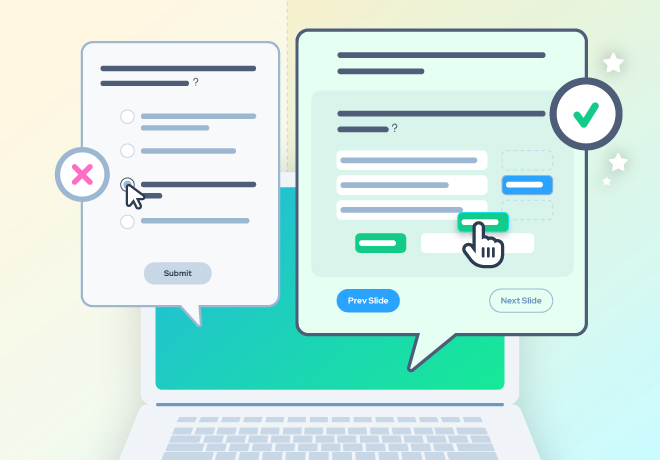
How do I prepare for an LMS demo?

Related articles
Get valuable eLearning insights to your inbox.
Listen to Neovation’s Demystifying eLearning podcast generated with NotebookLM!
Listen to our podcast on your favorite platform!
Buying an LMS is a major investment for your company. In my article “How do I prepare for my first call with an LMS sales rep,” I provided you with a road map to help you navigate what might be an undiscovered country. Buying an LMS is a journey – whether it is your first or your next LMS. If you haven’t read that article, please give it a quick read – and then rejoin me here for the next leg of the voyage.
In this article, we'll help guide you through the entire LMS demo process, including pre- and post-demo. You'll learn:
- How to schedule your actual LMS demo – including who should attend
- Questions you can ask to help get your LMS demo underway – including how to consider all your learners
- Post-demo reflection questions which can help you align what you learned in the LMS demo to your training needs
- How to make sense and categorize multiple LMS demos
- And finally, how to conduct post-demo follow-up questions and review with your selected LMS vendors
The actual LMS platform demonstration!
Based on your previous calls, you will have selected a couple of LMS vendors you want to take to the next level of conversation, and they will be with vendors equally interested in your potential as a client. Most LMS demos will last between 30 and 90 minutes.
No two vendors treat an LMS demo the same way. Before your demo, ask for an outline or an agenda of what will be covered to set your expectations and allow you to prepare your questions. The better your understanding of your actual LMS needs, the more beneficial the demo will be to you. Divide those requirements into your must-haves and your nice-to-haves, give that to your sales rep in advance of the LMS demo, and request that they show you how their product and service offerings will meet both those lists.
If you think you need your LMS platform to do something that isn’t on your critical list, you may need to reconsider the importance of this feature. Consider how you would answer this question from a potential provider. “Assuming our solution met all the other requirements but was missing THIS LMS feature – and we were willing to give you our platform for free – would you still insist on having this feature, or could you live without it?”
Once your list of LMS features has been explored, you can then measure each learning platform you are evaluating against the same criteria (this means you will be adding some columns to your LMS vendor selection criteria evaluation spreadsheet, right?)
Who should attend an LMS demo?
There’s a saying that I think really can apply to LMS product demos. “If you want to go fast, go alone. If you want to go further, go together. P.S. It is dangerous to go alone.” There’s a little bit of truth in that when it comes to product demos. This is when you want to assemble the best possible team of stakeholders and interested parties to bring all their questions to the table, drawing on the wisdom of every cohort that will be affected by your choice of eLearning platform.
Who are these fellow adventurers that you may want to join you on your journey? I’m going to present you with a list of roles, realizing that depending on your organization, some may be the same person – or you may be in one or more of these roles:
- The primary decision maker
- Your Chief Learning Officer (CLO)
- Training managers or senior trainers
- LMS administrators
- Training content creators
- IT team members
- HR team members
- A trusted training advisor, instructional design consultant, or learning consultant
- Someone who will be a learner or end-user

You might include key members of management teams that will be directly impacted by the LMS purchase, too. They can consider the needs of their departments and their learners as part of the LMS demo evaluation.
Questions you can ask to get your LMS demo started
You might ask the LMS vendor to show you some specific features like:
- Brandable elements and white-labeling options
- Content creation and course building or eLearning authoring
- Custom LMS features like knowledge bases, training assessment features, and dashboards
- Customer support (response time service level agreement (SLA), end-user support)
- Forums and other social learning functionality
- Gamification elements or game-based learning features
- How the LMS handles instructor-led training (ILT)
- How training administrators will use the LMS
- Integrations with other software systems, like your HRIS
- Learning plans, course enrollments, and notification capabilities
- LMS features for learners to help improve the learner experience
- Mobile learning
- Onboarding and implementation programs
- LMS accessibility features
- Reports
- SCORM compatibility
You’ll also want to talk about anticipated timeframes for you to get started, once you sign your contract. How long until your onboarding or implementation starts – how many clients are in the queue ahead of you? What resources will they need from YOUR team? Who do they recommend being part of your training program’s onboarding, implementation, and rollout process? Do they need access to a group of test learners to evaluate the LMS software or course delivery as a pilot program before the company-wide launch?
Consider all of your LMS users
Another thing to keep in mind is that there are several distinct user groups that will be affected by your choice of LMS platform and vendor. Their needs are distinctly different, and you need to consider each cohort as you make your LMS demo evaluations.
Overall, you want to ensure you are evaluating the following points:
- Features of the LMS
- Implementation of the LMS
- LMS administrator services
- Moving from an existing training platform or system and the data migration
- On-going software training, service or assistance, and after-purchase support for the LMS
The difference between LMS admins and end-users
Successful online training is engaging and easy to use – for both your training admins and your end-users. Each cohort will bring a very different perspective on how well any LMS platform meets its needs. An LMS that is easy for trainers to update information and assign courses but that learners find difficult to use will not gain the traction you need to have a successful online learning program. Similarly, if the learners find it fun and engaging, but your admins struggle to pull appropriate reports to demonstrate learner accomplishment and KPI improvement – upper management will not be able to see the ROI of their online training investment.
Your top ten questions you should have answers for after your LMS demo
Before choosing a new LMS, be sure to find out the answers to these ten questions during your demo evaluation meetings.
1. Does your LMS have the features I need?
Keep your LMS search focused on your actual needs, your company’s training strategy and desired training outcomes, your internal workflows, your overall eLearning environment or ecosystem, and any changes you want to make. Your goal is to have your learners and training team succeed. Have you thought about:
- Customization for different groups of learners?
- Personalized learning plans?
- Third-party content libraries?
- Built-in content creation studio or course authoring capabilities?
- Integration with webinar platforms?
Ask LMS vendors about these features.
.png)
2. What will make your learners love their LMS?
Your company’s needs are unique, as are the needs of your learners. Are the needs of your workforce being met? Will your learners be able to easily and enjoyably:
- Find their courses and complete their training?
- Have quick access to specific content or a quick way to check upcoming deadlines?
- Get updates on what courses they are enrolled in, how far they’ve come, and how much training they have left to do?
Will your LMS provide learners with customized home pages designed to suit your learners in your environment following your workflows? Ask LMS vendors how they customize their LMS for your learners — and hopefully, they will go far beyond just sticking your logo in the corner and adding your corporate colors.
3. How easily can I create and deploy content using your LMS?
So many questions, like:
- Does their LMS include an easy-to-use training content creation or eLearning authoring feature?
- How easily and quickly can your team create multimedia content, including videos with narration, animations, and games, add in PDFs and eBooks, and offer quizzes?
- Will you need to purchase additional software or online tools?
- Is it easy to add your existing content – or third-party content?
- Is their LMS compatible with industry standardized formats like SCORM, xAPI, or cmi5?
- What’s involved in updating content after it’s loaded and deployed?
- Is there version control, or do learners only get the updated content?
- Are learners automatically enrolled in the most recent version of courses they need for compliance, certification, and licensing requirements?
4. Will your LMS keep my content and learner data secure?
Your employees share their personal data with you based on the implicit understanding that their personal information is safe. Every software vendor you consider – LMS or otherwise, needs to be able to talk about and document their data security protocols. At the same time, your management team needs to be able to access and assess learner data easily to track learner progress. Data security should be intelligent, not onerous, invisible, and not a barrier to being used to measure results.
You’ll want to ask about:
- Permission-based access to information at various levels of access
- Security of group chats and social learning channels used for collaboration
- Access controls to reports, test scores, and learner records
- Protection against data breaches, hacking, and malware
- Data hosting backup, and storage, ensuring compliance with industry security standards.
5. How much of your training administration can you automate?
Intelligent training automation can reduce the burden of training administration on your Learning and Development team. Can your LMS:
- Automate enrollments?
- Send notifications to learners to start or continue with their training?
- Remind learners when their certification may lapse, re-enrolling them in appropriate training in advance of their certificates’ expiration?
- Generate and email regular reports?
- Import user data?
- Import course content from course libraries with minimal customization?
6. How does their LMS pricing scale as your organization and needs grow?
Companies grow, downsize, merge and acquire or get acquired. You may have seasonal surges in employee counts, depending on your industry. Here are some considerations that may affect pricing:
- How does the vendor measure the number of learners in their system – is it by user count or by active enrollment – meaning that the vendor only counts users who log into training in a given month as active users?
- Ask LMS vendors how their charges will change as your company usage grows. You want to know what you’re paying for your new LMS — and how that will change in the future as you add learners, add content and courses, or both.
- Make sure you know what’s included and what you will be paying extra for. You want to avoid paying a higher price for features you are unlikely to use.
- Is onboarding, implementation, and ongoing support included in the LMS cost or fee? Are there limits to support service delivery or tiers of support you need to consider to ensure your needs are met?
.png)
7. What types of reports and data visualizations can I create?
Your LMS exists to show you that learners are making progress. You may also need to show regulators or auditors that your learners have completed the compliance training required to maintain their certification standing. You’ll want to ask about:
- What types of learner progress and performance data does their LMS collect?
- How can your admins customize reports?
- Can reports be generated automatically?
- Can it provide clear data visualizations that you can use to demonstrate the value of training and the LMS to your C-suite?
- Does your LMS integrate with business intelligence (BI) tools, such as PowerBI™?
- Will the LMS be able to generate reports and analytics that meet your needs when reporting on compliance training to third-party auditors?
8. How will you be supported before and after the launch?
Good support is crucial to your success – you are buying a complicated piece of software, and you will have people with various levels of comfort and experience using it. The need for support is a given. Make sure to ask these questions:
- Are there tiered levels of support, and what are the differences between them - and the costs?
- How long will you wait for a resolution if you need assistance or experience an incident? This is not necessarily how many rings it takes for them to answer the phone (totally acceptable if your call goes into a voicemail queue for routing to reps for a callback.) The core question is how soon you can expect results and resolutions.
- What are the support team’s hours of operation, and how do they deal with clients outside their time zone? What about holidays?
- Is there a prioritization protocol for truly urgent or emergency requests? Anything less than 24x7x365 emergency response by an actual human who knows your system inside and out is simply unacceptable – how long will it take for them to respond?
- Support includes setting you up for a successful launch of your training program. Does your vendor provide comprehensive implementation services and administrator training on deploying and using the LMS?
- Are there tutorials and help for your admins for the lifetime of your relationship?
- Can you see their online help system to see how comprehensive it is?
.png)
If the vendor doesn’t deliver training to their own team using their own platform, ask why. That could be a huge red flag!
9. Will your LMS integrate with the rest of my ecosystem?
Your LMS may need to “talk” to other software you use – and have other best practices and ease-of-use features to improve the user experience – for admins and learners alike. Does the platform:
- Have single-sign-on (SSO) capabilities to minimize user login errors? (and stress)
- Integrate with eCommerce, HRIS, data warehouses, and webinar or virtual classroom platforms?
- Automate user sync data exchanges with your HRIS or talent management system?
- Allow for custom integrations to other applications to prevent having to update multiple systems manually?
Ask vendors about integrations with all the elements of your training and talent management ecosystem.
10. How will your LMS feature set grow to support my future needs?
This is the beginning of a long-term relationship. In the same way that your company’s needs will shift over time, so will the standards of eLearning technology. Future-proof yourself against potential issues by asking:
- What is your vendor's process to anticipate future trends and technologies?
- Is their platform built to grow and evolve to meet changing industry standards easily?
- How often do they release updates?
- Are client requests considered when planning feature improvements?
- Is there a schedule for upgrades, or are they ad hoc – and how much notice is provided (and how) if the platform has to go offline for scheduled maintenance?
- What new features are already in the development pipeline?
Making sense of all your LMS demos
Hopefully, you’ve been updating your LMS vendor selection criteria evaluation spreadsheet and collating your notes as you go. Some LMS companies will have documentation on their features and benefits, others may put together a customized assessment of your needs and how well their platform meets them – a document that may or may not include pricing information.
In my previous article on preparing for your discovery call, I recommend you create some form of points scoring, to empirically measure how well each platform you evaluate meets your “must-haves” and your ‘nice-to-haves” as well as their additional options for onboarding, implementations, data management, and integrations.
Here’s the part that some prospects get wrong. They start becoming reactive rather than remaining objective as they experience sales pitch after sales pitch. They start giving more value to the bells, whistles, and personality of the salesperson than to the essential features, key benefits, and core functionality of the software they are evaluating.
I can’t stress this enough. After your discovery calls (all of them) and before your LMS product demos (any of them), define your evaluation criteria, determine your measurement scale, and then keep those two things consistent throughout all your presentations. Ensure that all your team members agree to the criteria before you engage in the LMS demo process. You want to avoid internal disagreement or political infighting in front of your potential LMS vendor – it just muddies the waters.
.png)
Equally important is the post-LMS-demo de-briefing. Once you have completed all your demos and evaluations, meet with your team to discuss your findings. Compare everyone’s notes and scorecards to create the shortest possible list of possible LMS platforms to take to the next level of evaluation. Document any questions that have not been satisfactorily answered or new questions that have come up due to new information or understanding on your collective part.
Contact and thank those vendors who will not be moving forward to the next stage and do them the courtesy of telling them why. That will prevent you from receiving a stream of “just following up on our LMS demo” emails – because the sales rep will be doing their job - to make themselves available to answer your questions. They will keep reaching out if they don’t know they are out of the running. Telling them why there were not chosen helps them understand where they or their software fell short and will lead to improvements on their side. Trust me. We take prospect feedback very seriously.
The next step – the post-LMS-demo deep dive
You’ve narrowed down your choices to the two or three vendors that you’ve rated as most suitable based on your evaluation criteria. You’ve collated all of your team’s questions and concerns from your LMS demo sessions. Now you schedule some follow-up meetings or calls to get these questions answered.
Essentially, at this point, you'll be ready to discuss the very real potential of hiring your selected or finalist LMS provider and start discussing pricing details, timelines, including optional services, and the timeline associated with deployment. This gives you more information to compare vendor to vendor. Share the answers and information with your stakeholder team again once you have all the information from all the vendors to continue to have an agnostic level playing field for evaluation.
It may take several meetings with the LMS vendors and your team to come to a decision. Many of your questions will likely be able to be answered by email. Again, pay attention to the responsiveness of your sales rep and their ability to understand your question, and answer “the question behind the question” – to demonstrate that they are paying attention to what really matters to you and your company as you make this decision. When it comes to your team’s involvement, include stakeholders as relevant to the conversations – budget, technology, integrations, deployment – ensuring all cards are on the table and all questions are sufficiently answered.
Look at your criteria, and tally up your scorecards. Call your disqualified LMS vendors, and break the bad news. Again, tell them why they were not selected. If there are any additional factors, like last-minute pricing discounts, that may come into play – this is the time to find out. It may reshape your decision.
The LMS proposal or contract review call
Make the last call to the company you have selected, get the agreement, and follow your internal processes to get it signed. A good LMS vendor will want to book a call to review their contract or proposal document with you BEFORE you sign it. They want to ensure that they have included everything you need and to give you the chance to ask any final questions. This is another step that many prospects want to skip, but it can uncover and resolve any last-minute additions or exceptions.
You are signing a legally binding document, so invest the thirty minutes it may take to allow the rep to review it with you. Trust me on this.
Now that you’ve selected the best LMS for you
Time to pop the champagne! You’ve arrived at your destination! You’ve made your decision. Well Done! This should be the beginning of a long-term relationship that both you and your new partner in training will value and enjoy for years to come. You can proceed with confidence and get started implementing your training strategy. You’ve made a major investment in your company's future – because employee training touches every aspect of a business’s performance.
We hope that our online training platform article series on the LMS vendor sales process and LMS platform demo has helped you. But wait – we aren’t ready to say goodbye – our journey isn’t over yet! We still have more great content to share with you. With your shiny new software selected, you’ll surely want to add courses to it. That can be achieved a number of ways through pre-packaged eLearning content libraries, creating training content with your own eLearning authoring tools, or rolling up your sleeves to develop custom eLearning. We’ve got some tools to help you find your way to this new destination.
Alternatively, if you’re still exploring platforms to bring your training program to life, take a stroll (and scroll) through our “Building your eLearning ecosystem” articles.
We hope to be walking together on this online training journey for a while – and let us know if you have any questions about the way as you continue your exploration of corporate online training! We’ll answer your question and you just might inspire another article or two!

With 15+ years of online marketing and online learning experience, Susan loves to share insights about where these two ROI-building practices can intersect and complement each other for your business or organization.
Become part of our L&D community
We publish a new learning hub article — full of useful, practical topics — weekly.
Not sure where where you want to start? Jump into one of our recently published articles and see where it takes you!








-svg.svg)
-svg.svg)
-svg.svg)
-svg.svg)